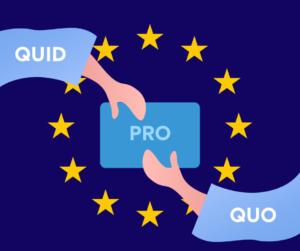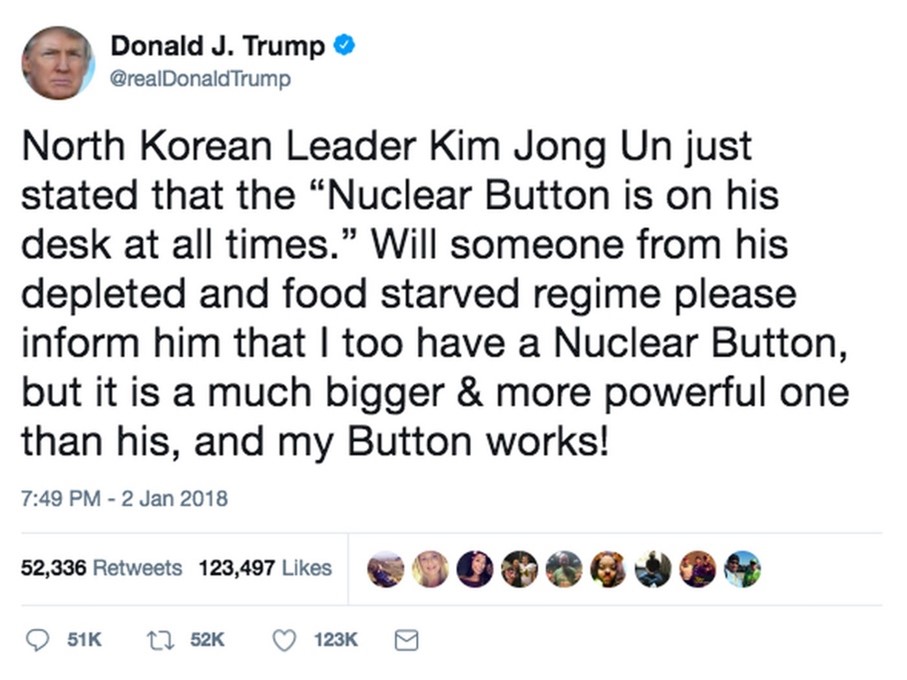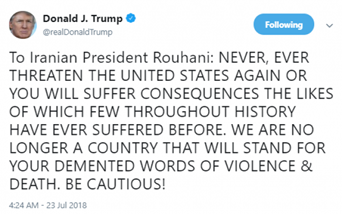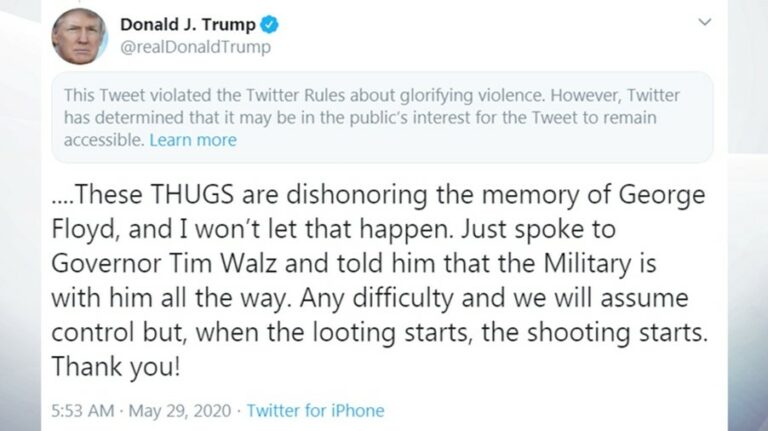Headquarters: Svetog Nauma 7, 11000
Office address: Đorđa Vajferta 13, 11000
Phone:: +381 11 4529 323

“To all of those who have asked, I will not be going to the Inauguration on January 20th.” – was tweeted by the outgoing American president Donald Trump on January 8th at 10:44 am. What he could not foresee is that these will be the last words he will publish on his account.
Trump’s fascination with Twitter has been a long-lasting one. His obsession with the number of followers, constant tweeting, but also the role which this social network played in the spread of his message, are huge. It was far more convenient for Trump to explain his views to his followers when he was limited to solely 280 characters, without explaining them in detail. Trump’s investment in his social media profiles, teams that led them, and companies such as Cambridge Analytics, paid off big time for him. Twitter is one of the most important factors that brought the Republican candidate his presidential victory in 2016. Without Twitter, he might not have been known as President Trump.


In the 11 years that he has had his Twitter account, Trump tweeted more than 56,000 times and accumulated over 88 million followers. Many of his tweets, including the “Build the wall” campaign, and calls to violence and hatred, were tolerated by Twitter and other networks.

On January 6th, the day when the Electoral College was supposed to confirm the election of a new president, Joseph Biden, violent protests and siege of the Capitol building led to the death of five people, including one police officer. The protests seemed chaotic and unplanned, which they were – somewhat. However, the role of social networks in developing attackers’ plans is quite clear. On the evening of the siege, right-wing groups discussed the plans via Facebook, as well as via portals where members of the right-wing ideology gather more often and where they have a greater freedom of speech, such as Parler or Gab.
The rioters posted selfies on social networks, pictures of the weapons they brought into the building, tips for avoiding the police, tools for breaking doors, as well as other content. Among the people leading the Capitol riot that day were right-wing trolls and members of QAnon, a website which compiles conspiracy theories, whose supporters have long been associated with President Trump, members of the Proud Boys and Oath Keepers… A formal link should and will be established after a series trial. However, there is no doubt that the American president, if nothing else, at the protests that day, but also earlier, especially through social networks, motivated and encouraged his followers to engage in this riot. Radical voters of the American president and conspiracy theorists have been preparing the protest for more than two months – for the most part, openly, through Twitter. The President only encouraged this by not wanting to accept the election results, and by spreading misinformation, by constantly questioned the American electoral system. On January 6th, when the Congress, composed of the House of Representatives and the Senate, was supposed to confirm the election of a new president, Trump called on the Vice President of the US, Mike Pence, who is chairing the Congress, to challenge the election results. Pence publicly said that he did not have such powers and that his role was primarily ceremonial, which led to the rejection of the Trump’s request with the words “So Help Me God”. On the same day, at a rally in front of the White House, just a few kilometers from the Capitol building where the Congress was meeting, Trump urged his supporters to join the riot. Rudi Giuliani, Trump’s lawyer and one of the most famous and influential supporters of the President, after a dozen lost lawsuits which were aimed at overthrowing the election results in certain states, demanded “trial by combat“ in front of the White House rally attendees so the election results are settled. After the violent escalation of the riot, which looking back was not surprising at the least, there was still room for the situation to improve. The whole world called upon the President to come out and condemn the violence and distance himself from the people in front of the Capitol. Instead, the President continued to insist that the election had been stolen, telling people in front of the Capitol to “Go home. You’re very special. We love you.” Some analysts are now arguing that a coup d’état took place that day.
On this historic day, the Congress, despite disruptions in its work that were unprecedented in the United States, confirmed the election of Joseph Biden as the new American President. Trump, on the other hand, who has less than two weeks left as the acting President, was threatened with impeachment, which would make him the only American President against whom the procedure has been initiated twice. Some groups of Republicans and Democrats are asking the Vice President to initiate the 25th Amendment, which marks the President as unfit or incapable of performing duties, with the Vice President taking over the Office and preventing Trump from running in 2024. At the time of writing of this blog, the President is impeached, which made him the only president who has been impeached twice. In the upcoming days, the impeachment will be discussed and decided upon by the Senate.
After January 6th, social networks, one by one, started to “cancel” Trump. The outgoing American President, who is still considered as the most powerful man in the world, was literally expelled from social networks. After so many years of intense and close ties with the networks that, whether they wanted it or not, were his best ally, the President of one of the greatest world powers was silenced. We live in times that are memorable, historical times that will be studied for a long time. The bizarreness of this situation was best described by a tweeter who said in his tweet “So Trump has access to the nuclear codes but he can’t Tweet or post to Facebook.”
Initially, Trump’s account was suspended for 12 hours on January 6, due to, as Twitter suggested, the impact it can have on the further escalation of violence. After “returning”, Trump managed to say two things – that 75 million “great American patriots” who voted for him, no one can “respect or treat the unfair” anymore, and that he will not attend the Inauguration of Joseph Biden. Although the President used to express opinions that are far more dangerous and that just about called to violence, Twitter has now decided to put an end to it. In its statement, Twitter insists that these tweets must be analyzed in the context of current events, that is, violent protests held two days earlier, or what may follow until the inauguration. By informing the supporters that he will not attend the inauguration, Trump may be telling his supporters that the event is a legitimate target of the attack – he will be safe.

Despite an impressive list of social networks on which the President has now been “cancelled”, including Shopify as well as hashtags related to him on Pinterest and other networks without a profile, there is no doubt that the ban from Twitter was the hardest pill to swallow for him. Although every president of the United States received an official Twitter profile called @POTUS (President of the United States of America), Trump used that Twitter profile mainly to retweet tweets he posted on @realdonaldtrump – his private account. However, when, after deleting his account, he tried to tweet from the @POTUS account, Twitter deleted every tweet within the same second.
@POTUS is an account that will be used by Biden starting January 20th. Although many internet trolls started making jokes regarding the fact that Trump will not give Biden access to the @POTUS account, affairs with the account of the sitting President will not work as such. Namely, just like when Trump took Office from Obama, all tweets of the outgoing president were archived on a separate account, and all followers were notified that there had been a change in the profile and were presented with a choice –to click whether they want to continue following the next POTUS.

After an unsuccessful tweet from the @POTUS account, after the official profile of his campaign, @teamtrump and after the account of his digital director who tried to transfer his account to Trump’s name was suspended, it became clear – Trump remained without a voice in the internet community. The most powerful man in the world lost his power of expression. Without retweeting from the @realdonaldtrump account, the @POTUS account, as well as the orders of his family members, seem abandoned and empty.
The question of how a few hundred people managed to get into the office of the Speaker of the House of Representatives Nancy Pelosi, how the Capitol could so easily “fall” into the hands of rioters, and how the electorate’s votes were so poorly protected is something that will be discussed for a long time in the US, including discussing before the courts. The catch is that the prosecutors will use the same tool as rioters to help them – social networks. Since nothing ever disappears from the internet, nor gets deleted, prosecutors will, by following hashtags and tweets, quickly discover the perpetrators.
It is clear how much social networks, in this case, Twitter, has managed to change the political discourse in the last ten years. Twitter, a network on which most politicians did not even have an account ten years ago, is now a network without which political debate cannot be imagined.
Although Trump’s suspension is certainly a major turning point, social networks have been fighting against the spread of misinformation and conspiracy theories for years. As a part of those campaigns, the popular right-wing website Daily Stormer was shut down four years ago. Alongside this website, 8chan, one of the most popular websites among the right-wing crowd was also shut down in 2017. This website has long been the world’s largest online base of the alternative right and was shut down after several terrorist attacks that were announced or broadcast live on this site.
Twitter has previously sanctioned irresponsible use of its network, even if it came from powerful people. In March 2020, Twitter deleted the posts of the Brazilian and Venezuelan presidents due to the spread of misinformation about the corona virus. Moreover, they took action against the American President in May of the same year when he tweeted about the Black Lives Matter movement, where he, as previously mentioned, used the quote “When the looting starts, shooting starts”. Twitter issued a warning that the tweet glorifies the violence and hid it from its users – the person did not see it until they clicked on it with their mouse or finger. Trump’s tweets often received the same label, which culminated after the November defeat and his statements, when almost every one of his tweets got flagged by either that label or a label for spreading misinformation. Twitter, like Facebook, is actively working on shutting down accounts related to QAnon conspiracy theories. Two days after its founding, Facebook deleted the “Stop the steal” group. The group in question had already gathered 320,000 followers, and Facebook failed to delete other content related to that group – including the use of that hashtag. Only a few days ago, Facebook committed to do that as well.
Immediately after Trump’s “cancellation”, the value of Twitter on the stock exchange market dropped by more than two billion dollars, and the value of Facebook shares fell as well. The sum of two billion dollars corresponds to the analysis from 2017, which states that Trump “earned” about two billion dollars on Twitter, by bringing his fans to this social network, by keeping people on the platform to read and engage with his posts, and thus, seeing advertisements. Although Twitter shares have fallen, as well as Facebook shares, analysts believe that in the long run, these networks will not be punished for cancelling Trump’s account, nor for suspending right-wing accounts. People’s anger will fade, and companies may want to invest more in advertising on these social networks, as it will be safer.
Social networks continue to have an incredible impact on events around the world, including in Uganda, where Facebook ordered the removal of several accounts related to the ruling party.
Article 230
In the US, there has been an active discussion for some time now regarding the Article 230 of the Communication Decency Act, which dates to 1996, which reads: “No one who provides or uses an interactive computer service (i.e. social network) will not be treated as a publisher or speaker of any information provided by another provider of information content.” The newly elected President of the US, Biden, advocates for the amendment to this Article. Interestingly, this Article bothered the sitting President as well. Both political parties have completely opposite reasons as to why they would amend this Article – Democrats argue that Article 230 is a shield for social networks and that it allows them not to be criminally liable if the content on them is fake or calls for violence. In other words, it is an article that grants legal immunity to social networks.
Gab – one of the more popular “refuges” for right-wingers and conspiracy theories is still running – for now. The App Store and Google Play Store do not offer this app; however, it is available for download through various browsers. A new place under the Internet Sun will be surely found quickly by right-wingers. On the other hand, conventional social networks have now set a great precedent, which has the possibility to be dangerous.
Social networks have shown great autonomy in decision-making and said – “the fact that everyone has the freedom to say what he wants, does not mean that we are obliged to enable him to do it through our platforms.” Freedom of speech in the US is regulated by the First Amendment, which, among other things, says that “Congress cannot pass any law that restricts freedom of speech.” The US goes a long way in defending free speech – a good example is the Pentagon Papers, when the US Supreme Court allowed the release of secret documents which indicated that the US administration greatly increased the scope of their military influence during the Vietnam War, including the bombing of Cambodia and Laos, about which the public in America was not informed. Although the leaked documents were classified as state secrets, and the person who released them was originally accused of espionage and high treason, the Supreme Court ruled that the state had not proved that the documents should remain secret. However, the rules that (do not) restrict freedom of speech that are prescribed by state constitutions and laws do not have to be identical to those that apply on social networks.
Following this logic, although someone has not been convicted for a certain statement or post, i.e. although that statement did not de facto violate the constitution or law of a particular country, this does not mean that one social network must still allow that statement or post to exist on it. Social network owners have the power to delete it simply because they don’t like it. Once again, this event raised a “burning” question: who should regulate the Internet: each social network itself, social networks together, by adopting some kind of declaration that each signatory would be obliged to respect, or each government every social network in its country?
Reactions from Europe
As previously mentioned, social networks have been fighting against extremism for a while now, however, the riots were the last drop which made all networks react simultaneously. Reactions and impression of the events are also pouring in from Europe. The countries of the European Union regulate the issue of social networks differently, and at the level of the Union, the field of data protection has been regulated for the time being, by adopting the General Regulation on Data Protection (GDPR). German Chancellor Angela Merkel said that the move to delete Trump’s profile was “problematic“. Manfred Weber, president of the European People’s Party, also expressed dissatisfaction, saying that the EU must not allow Facebook and Twitter to decide what is within the limits of what is acceptable on their platforms, and that American “Big Tech” companies in Europe will certainly not be able to decide what can and cannot be said in democratic discourse, but that it will be regulated at the level of the Union. The head of EU diplomacy, Joseph Borrell, said that Europe must regulate the content on social networks better than they are regulating it now, in order to respect freedom of expression, but provide it its borders. Borrell was categorical in his blog that this cannot be done according to the rules and procedures set by private actors (owners of social networks). European Commissioner for the Internal Market, Thierry Breton, said that January 8, 2021, is a turning point like September 11 – a date that marks a paradigm shift around the world, but only this time the shift is digital. According to him, social networks can no longer “wash their hands” and must take responsibility for the behaviour of people on their platforms.
The European Union is afraid (and does not want) what happened to Trump to spill over and affect Uganda in a similar manner. That is why the EU advocates for clear rules which would regulate the work of social networks, and not allow social networks to control themselves. A Europe fit for the digital age is one of the six priorities of the current Commission, for the period 2019-2024. The EU’s Digital Agenda places the fight against misinformation, illegal content and closed platforms and monopolies held by hosting providers among the most important goals.
Back in August 2020, a few months after social networks, primarily Twitter, intensified the “flagging” of certain tweets with a warning that they called for violence and / or spread of misinformation, Trump issued an Executive order to prevent censorship on social networks. The more conservative side of the US believes that their voices have been censored more than the voices of the “left”, that is, that social networks are selective in marking or flagging, and in recent days, they believe, this has been proven. In the US state of Florida, lawmakers have already launched initiatives to prevent this “selective censorship” on social media.
However, given the nature of the sitting President, it is certain that he will not allow himself to be silenced. He has already announced something new, so there are indications that he is considering creating his own platform. Those right-wingers who were banned before him, or who were part of groups such as “Stop the steal” that Facebook banned, moved onto the social network Parler, which became increasingly popular in late 2020, as conventional social networks increasingly tightened the noose around conspiracy theorists. Although the network was also used by people who do not have extreme views – the group also attracted traditional Republicans, including senator and presidential candidate Ted Cruz, who had five million followers on this network.
However, by the end of December the Proud Boys, an organization associated to Trump, arranged the gathering on January 6th. This came after Trump’s ‘almost’ approval of its activities during its first presidential debate, which gave them legitimacy. Trump would probably switch to this platform to start, but accounts on Parler were, one by one, being suspended. The app first disappeared from the Google Play Store. On the other hand, Apple gave the app 24 hours to establish clear rules and guidelines as to how it plans to sanction the spread of misinformation and calls to violence. After the network did not do as demanded, the application disappeared from the App Store, and soon after, its hosting was terminated by Amazon Web Services, the largest hosting provider in the world. This network thus became inaccessible. Parler can certainly try to find a new operating space with other hosting providers, but it is likely that it will face a lot of closed doors. Because of its losses, Parler intends to sue Amazon.
Whatever happens next, when it comes to the US, in the next four years, it will to a large extent be decided by the Democrats. The Republican Party is expecting difficult years in which they will have no control over the House of Representatives, the Senate or the White House. The majority in the Supreme Court is also questionable, as Democrats now have room to expand the number of judges (packing the court). However, the new administration is facing a difficult path to unite the country, to resolve several important issues, of which freedom of speech on the Internet is perhaps one of the most important. This will be very difficult, given that millions of Americans still believe that Trump has achieved a great victory, which was taken over by the “deep state”, and that conspiracy theories and suspicions of the American electoral system are more widespread than ever – thanks to (not) controlling social networks.